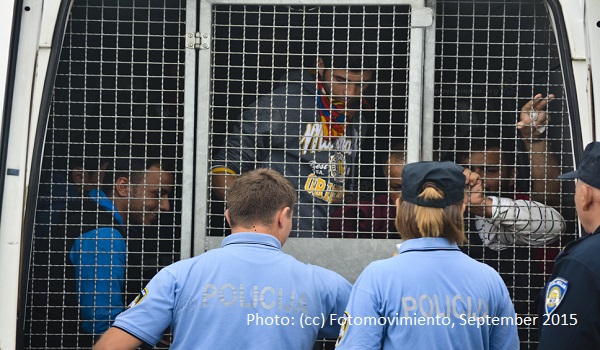Italian Interior Minister promises intensified border controls as arrivals via the Balkan Route to Italy surge. Forty people are quarantined in inhumane conditions in the Italian city Udine, sheltered in buses. Since the beginning of 2020, more than 400 people were pushed back from Italy to Slovenia. In northern Bosnia, locals organise ‘hunts on migrants’ in a Facebook group. Six people who were pushed back to Serbia by Bosnian police forces have recently drowned in the Drina river. In northern Croatia, a police officer shot at an Albanian national who was transporting migrants towards the Slovenian border.
Local politicians in Friuli Venezia Giulia, north-eastern Italy, call for intensified controls at the border with Slovenia and relocation of new arrivals to other regions. Interior Minister Luciana Lamorgese visited the region’s capital Trieste last week to discuss the current surge in arrivals via the Balkan Route and assured that additional military forces would be send to the region.
Since the beginning of 2020, more than 3,000 people reportedly crossed the Slovenian border to Italy irregularly. Recently, there have been reports on arrivals from Slovenia almost daily. The region’s reception capacities are insufficient and not equipped to accommodate minors, who form a substantial share of those arriving. Conditions in overcrowded reception facilities are worsening and offer no room for social distancing amid the COVID-19 pandemic. In Udine, about forty people are currently held in inhumane conditions for a fourteen-day quarantine outdoors on the compound of a former psychiatric clinic. The only shelter provided are three buses that are parked on the premises.
Pushbacks by Italian police forces to Slovenia have been on the rise in 2020. More than 400 individuals were “informally readmitted” under a bilateral agreement – without being given the chance to seek international protection. The practice is highly criticised and reportedly often results in chain-pushbacks to non-member states such as Bosnia and Herzegovina.
In Velika Kladuša, northern Bosnia, which is a popular transit point for people on the move, locals use social media platforms to organise ‘hunts on migrants’. A Facebook group founded in mid-August grew to more than 6,000 members in only a month. In the group, members post pictures of migrants they encounter, calling like-minded group members to a brawl. No Name Kitchen, a grassroot organisation catering to migrants in the area, has collected testimonies on injuries resulting from such brawls. This exposure to violence adds to the risks for people in need of protection in a region where the abuse by officials during pushback operations is widespread.
On September 17, more than a hundred people protested against the presence of migrants and a planned reception centre in Velika Kladuša. Anti-migrant attitudes have grown in the region over the past months and were further heated by local newspapers reporting on thefts and violence allegedly carried out by migrants.
On September 14, a lifeless body was found on a road side close to the Croatian border on Bosnian ground. The identification card of a North Macedonian reception centre was found with the body, identifying him as a 40-year-old man from Pakistan. Investigations are on-going.
Six people have drowned since the beginning of the month in the Drina, the river that marks the border between Serbia and Bosnia and Herzegovina. Migrants who use small boats or rafts to cross the river are regularly met by Bosnian police at the shore who force them back into the water. This recently happened to a group of nine – only five made it back swimming, four others drowned.
In northern Croatia close to Momiano, a Croatian police officer opened fire on an Albanian national who was driving about fifteen migrants towards the Slovenian border on September 14. The incident occurred as the driver tried to escape after police forces stopped the group. The injured man was transferred for medical treatment to Pula and an investigation of the incident was initiated.
For further information:
- ECRE, Balkans: New Report Details Illegal Pushbacks and Border Violence, August 2020
- ECRE, Slovenia Plans New Barriers at the Border while Pushbacks and Violence Continue Across the Balkans, 17 April 2020
- ECRE, Balkans: New Protests Along the EU Borders, 21 February 2020
- ECRE, Croatia: New Report on Torture of Asylum Seekers by Authorities, 31 January 2020
- ECRE, Shots Fired, Arrests and Violent Push Back Reported at the Serbian Hungarian Border, 31 January 2020
Photo: (cc) Fotomovimiento, September 2015
This article appeared in the ECRE Weekly Bulletin . You can subscribe to the Weekly Bulletin here.

